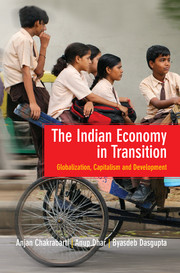Book contents
- Frontmatter
- Contents
- Preface
- Introduction
- Chapter I The Condition of the Working Class in Contemporary India
- Chapter II Capitalism: The ‘Delusive Appearance of Things’
- Chapter III Post-colonial Development and ‘The Thought of the Outside’
- Chapter IV The Word and the World of Neo-liberalism
- Chapter V The Scrypt of Transition: Between the Spectral and the Secret Thereof
- Chapter VI From Self-reliance to Neo-liberalism: The Political Economy of ‘Reform’ (1991–2014)
- Chapter VII Global Capitalism and World of the Third: The Emergent Cartography of the Indian Economy
- Chapter VIII Inclusive Development, State and Violence
- Chapter IX From Economic Crisis to Transition Crisis
- Conclusion
- Bibliography
- Author Index
- Subject Index
Chapter VIII - Inclusive Development, State and Violence
Published online by Cambridge University Press: 18 December 2015
- Frontmatter
- Contents
- Preface
- Introduction
- Chapter I The Condition of the Working Class in Contemporary India
- Chapter II Capitalism: The ‘Delusive Appearance of Things’
- Chapter III Post-colonial Development and ‘The Thought of the Outside’
- Chapter IV The Word and the World of Neo-liberalism
- Chapter V The Scrypt of Transition: Between the Spectral and the Secret Thereof
- Chapter VI From Self-reliance to Neo-liberalism: The Political Economy of ‘Reform’ (1991–2014)
- Chapter VII Global Capitalism and World of the Third: The Emergent Cartography of the Indian Economy
- Chapter VIII Inclusive Development, State and Violence
- Chapter IX From Economic Crisis to Transition Crisis
- Conclusion
- Bibliography
- Author Index
- Subject Index
Summary
Development is the master remedy to win over people.
Manmohan Singh, former Prime Minister of India referring to Maoism‘Winning over people’ is a political question. On the other hand, development, on the face of it, seems to be an economic matter. It is a reconstruction of the economic, a master remedy, which must subsume the political and the cultural. The point of development is also not to exclude, but to include people. The point of inclusion is to win over people, to hegemonize the masses into the delusion of the new Order of Things. One, thus, cannot detach the question of (inclusive) development from the larger economicpolitical agenda, and the cultural effects, although in the process, it opens up new avenues of contestation and conflict. As such, inclusive development takes the state and Indian economic transition to an ambiguous place. Why? Primarily, because while the stated agenda of development is inclusion, people at the grassroots could be experiencing exclusion (and marginalization). So, something needed to be done; something in excess of the circuits of global capital and neo-liberal globalization; something in addition to growth. Inclusive development was that ‘beyond’. It was a way of ‘winning over people’, winning over the majority or the aam admi; because the aam admi does count in liberal political democracy. The manner of winning over people is though costly; this cost becomes a bone of contention especially in the face of faltering growth. The gainers of reforms are led to believe that this cost is a social waste that could be avoided. Moreover, it imposes distortionary effects on the functioning of the real economy. Due to contradictory pressures from various segments of social pyramid, inclusive development emerges as a contested and contentious category. This is one reason why it has exhibited so much difficulty in generating a ‘social settlement’ among various stakeholders.
For convenience sake, from today's vantage point, we can divide the postreform era into two periods: 1991 to 2004–2005 and thereafter. By the end of the first period, a realization dawned: while one side of India's post reform story is rapid income growth and prosperity, the other side is about increasing income, social and structural divide.
- Type
- Chapter
- Information
- The Indian Economy in TransitionGlobalization, Capitalism and Development, pp. 289 - 338Publisher: Cambridge University PressPrint publication year: 2015



